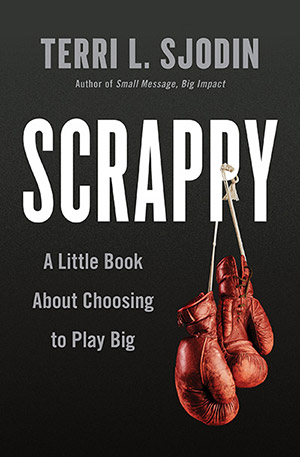
Manifesting goals and dreams requires a mindset of thinking big — beyond your limiting beliefs — and supporting that with bold action
—
While I can’t pinpoint the first time I heard the word “scrappy,” I do recall becoming aware of the idea, the feeling of it, the notion of doing something to stand out from other people going after the same opportunities I wanted. It was 1988, and I had just graduated from college and was beginning to launch my career. Differentiating myself from other hopeful, prepared, hardworking candidates with solid résumés was something I knew was vitally important for my success. The challenge was that I didn’t have contacts, a network, or an Ivy League degree to gain access to the people who could help me, and it seemed as though I was getting screened out of prospective jobs before getting a shot. That feeling was frustrating and discouraging. I felt there had to be a better way.
The advice I heard most often was to “be patient,” and that if I paid my dues and kept “working at it,” I would gain enough experience through the “school of hard knocks” to learn how to “get the job done.”
That was exactly the opposite of what I wanted to hear. I was determined to get there faster, smarter, and with class and style.
Not knowing how to make that happen, I was looking for clues. Then one ordinary Friday night at the movies with friends, everything shifted. We were watching the Oliver Stone film Wall Street, and a specific sequence of scenes provided just what I needed: it changed my perspective and opened the door to this notion of getting “scrappy.”
Bud Fox, an ambitious young stockbroker portrayed by Charlie Sheen, was trying to build his portfolio of clients, and Gordon Gekko, a powerful corporate raider played by Michael Douglas, was a “dream prospect” but also a seemingly impossible person to reach. To get a shot, Bud decided to do something to stand out from his competitors. He called Gordon Gekko’s office every day for fifty-nine days in a row and crafted a plan to visit Gekko on his birthday to present him with a box of his favorite type of rare cigars. Gekko was impressed with Bud’s daring effort and granted him an interview. It was creative, a little costly, bold and scrappy. It earned Bud Fox a few minutes with the key decision maker he’d been seeking.
The whole plan — the homework, the cigars, and the effort to bond with Gordon Gekko’s assistant — got Bud Fox in the door. He got his shot, and I got the lesson.
Over the years, I have gone back to Bud Fox’s scrappy moment as motivation to get past a challenge, and it still works for me. My snapshot reference to Wall Street is not about the archetypal portrayal of 1980s excess — it was merely the trigger that set in motion my own efforts to be a “scrapper” and get scrappy for the first time. Bud Fox was the example I needed, and the film inspired me to take some definitive action — so I did.
Now, more than twenty-five years later, nothing has really changed.
Sure, the landscape is different, and I have more contacts, but I still get scrappy to break through barriers, meet challenges, and find solutions. It is a vital piece of every professional challenge I face.
Sometimes I have to employ a detailed strategy or plan to connect with the right people to get where I want to go. Other times developing a plan isn’t possible and I simply have to ‘punt’. Ultimately, I have developed a checklist of sorts, allowing for flexibility in various circumstances.
We all have dreams, wishes, and hopes for the future — a desire to accomplish certain things in our lives. We all experience challenging situations that make us say, “Okay, now what?” We hope someday we will get a break and it will magically happen (whatever your “it” is, right?). As time goes by, we may find ourselves so deeply entrenched in daily life that our dreams can get pushed aside. We realize they don’t come easily. Sometimes, even when we do get a shot at a dream, it feels like the odds are stacked against us. The competition is tough and we know it! So sometimes we postpone our efforts — or maybe even self-select out.
Maybe you’re standing at a crossroads or have encountered a roadblock. Maybe you just aren’t sure what’s next. I wrote this book as the result of my feeling that way too. Under these same circumstances, when I’m stuck, I look to those inspiring individuals who have what I call a “scrappy mindset” or “scrappers.”
A scrapper is a person who is a fighter or serious competitor, especially one always ready or eager for a bout or contest.
Think in terms of the best lightweight scrapper in boxing. Let’s not take this literally — you don’t need to be overly aggressive and get in a scuffle. I’m speaking to the spirit of the word. To simply call their scrappy successes miracles or lucky breaks would suggest it is not possible to replicate their methods, but the good news is you can. Scrappers don’t just think about what could be — they execute a scrappy effort and make things happen.
Through the years, I have followed their lead and attempted to break through barriers, find a window when I can’t go through the front door, and beat the odds. Sometimes it works, sometimes it doesn’t. But it always feels better to do something and shake things up a bit. Even when a plan fails to work, it creates new avenues of thought and other pathways that push things forward.
Even if the chances of being seen, heard, discovered, or selected for a specific opportunity seem slim, when you get the chance, how do you make it count? How do you make yourself stand out? How do you get noticed in a positive way? Simple. You apply resourceful and creative inspiration to your situation and give yourself the edge. You work smarter and get scrappy!
Anyone can be scrappy. It’s a choice to play big, or at least big for you. It’s what you do when you’re all in and ready to put your tush on the line.
[Reprinted from Scrappy: A Little Book about Choosing to Play Big by Terri Sjodin with permission of Portfolio, an imprint of Penguin Publishing Group, a division of Penguin Random House LLC. Copyright (c) Terri L. Sjodin, 2016.]
You may also enjoy Interview: Jonathan Fields | The Good Life with Kristen Noel
